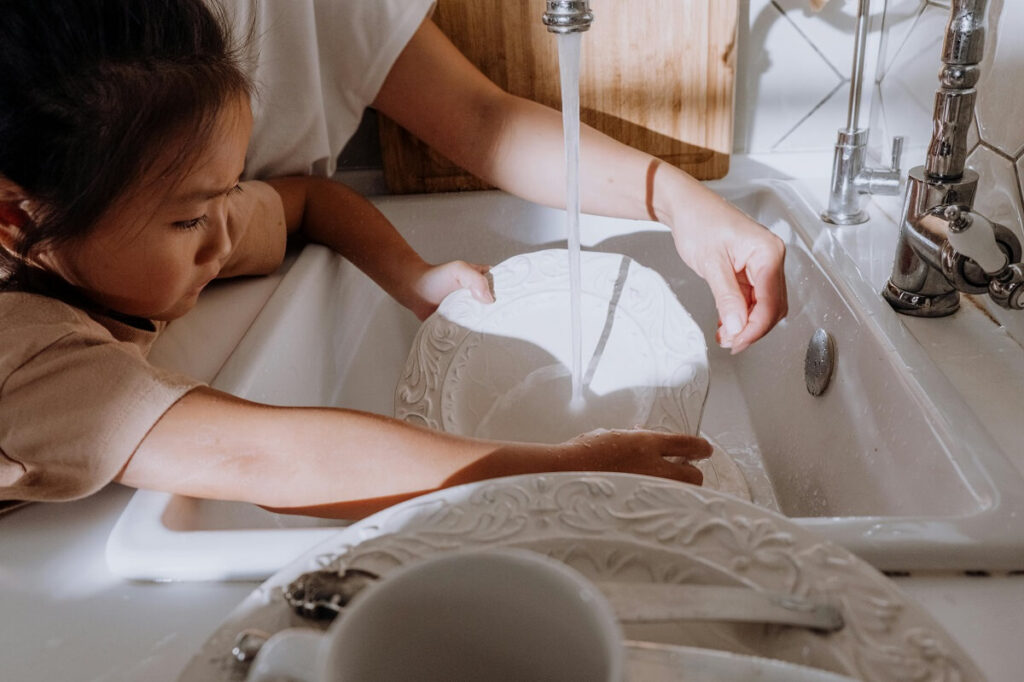
From a very early age, the Montessori method focuses on helping children become independent and self-reliant. These are not merely buzzwords. They are traits that contribute to success in the real world.
Fostering a sense of independence means allowing children to gain practical life experience through classroom activities. In turn, more self-reliant students make critical connections between the classroom environment and the world around them.
In the Montessori kindergarten classroom, chores play a significant role in their development, and there are several reasons.
Chores Can Begin to Grow a Child’s Self-Confidence
Children develop self-confidence when they know they have what it takes to do things for themselves. Although tasks like sweeping a floor or cleaning up a spill may seem simple, these activities actually help a child see that they have the personal competence and autonomy to take care of themselves and their environment.
When your kindergarten child completes a chore, they feel the satisfaction that comes with accomplishment. As these feelings accumulate over time, students learn to feel good about themselves and their abilities, which builds their self-esteem.
Community Contribution Matters
The Montessori method not only helps children learn to do tasks for themselves, but it also shows them that they can do them for others.
Completing chores helps Montessori students develop empathy, grace, and courtesy by caring for the people around them. When they engage in these activities, it benefits everyone in the environment. Recipients appreciate the help, and children learn the importance of working together to maintain the space.
Community contributions help kindergarten children learn to prioritize the feelings and needs of others just as they do for themselves. They develop a sense of belonging, understanding that they play a role in an ecosystem bigger than themselves.
A Child Can Develop Real-World Skills
There’s no getting around the fact that chores are real-world skills. Parents do them all the time because they are part of the necessary work to maintain a home. If they don’t, natural consequences (such as personal discomfort and the deterioration of the space) will occur.
When children complete chores while they’re young, they’ll already have the practical life skills needed to maintain a home when they become adults. In this way, these activities in the Montessori kindergarten classroom contribute to success in life by helping a child learn to prioritize tasks and engage in delayed gratification.
A Child Can Be Exposed to Critical Skills
Doing chores helps young students develop their motor skills, as they continually have to hold, lift, carry, turn, and manipulate cleaning tools and materials like brooms, mops, and paper towels.
They can also help children learn problem-solving skills by giving them the opportunity to select the right materials for the job, figure out how to ask others for help, and discover how to fit necessary tasks into their schedule when they have time-sensitive tasks to attend to.
Additionally, the tasks can be used to teach mathematical concepts and help connect them to the real world. For example, setting the table and doing laundry can help teach them about counting and sorting. Loading the dishwasher and putting away toys can teach them about capacity and volume.
Practical Experience Sets Children Up for Success
Giving your child the opportunity to do things for themselves and others makes success later in life much more likely. At Flagstaff Montessori, we believe wholeheartedly in the brain’s connection to the work of the hands.
In our Montessori kindergarten program at the Sunnyside Campus, we use hands-on activities to help children grow into autonomous beings who are both academically and personally competent. If you’re looking for a place where your child can learn practical, real-world skills, we can help. Contact us today to learn more about our programs and get your child started on the path to lifelong learning.
